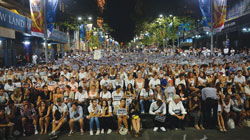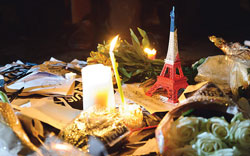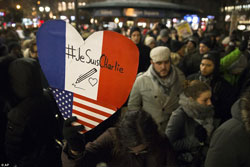Twelve people working for satirical magazine Charlie Hebdo were shot and killed in Paris, France by two Islamic extremists who sought revenge for the magazine’s depiction of the Prophet Muhammad on Wednesday, Jan. 7, sending waves of shock and fear throughout all of Europe and other parts of the world. In light of these recent events, the number of students looking to study abroad may begin to decrease.
According to the official website of NAFSA: Association of International Educators, 289,408 students studied abroad during the 2012-2013 academic year, which was still only about one percent of all United States students enrolled at institutions of higher education in the country at that time. However, when terror attacks occur abroad, much like the most recent ones in Paris, fewer students might become interested in leaving their home country, or may even show fear while spending time abroad.
Just days after the shooting at the Charlie Hebdo offices, the University’s spring 2015 study abroad group left to spend the semester in London, England. Kelli Galayda, a sophomore communication major, recalled, “Seeing the attacks on the news just days before I came [to London] had me terrified.”
According to Morgan Baskin in a USA Today article published on Jan. 15, “Students Abroad Left Uninformed by Universities in Wake of Terror Attacks,” the U.S. State Department has not issued a travel warning for France, but the French government has increased security across the country. On Jan. 7, the Interior Ministry announced that it would raise its internal anti-terrorist security plan to “attack alert” level, its highest level of domestic security, in the wake of the Charlie Hebdo shooting.
“These attacks are a reminder to be prepared and to plan for the unexpected. If you are present when a situation like this unfolds, you have to remember to take action and do whatever it takes to remain safe,” said Dean Volpe, Captain of the Monmouth University Police Department (MUPD). MUPD works closely with the University’s Study Abroad Office to ensure the safety of the students who travel abroad.
 With programs in England, Italy, Spain, and Australia, it is important for the University to stay up to date with global news. Volpe explains that there is a University policy for managing emergencies abroad, and the first step “is to monitor the safety and security conditions around the world, particularly where our students study.” The remainder of the policy focuses on the University’s response to any emergency that could occur, such as an individual student’s sudden illness or a larger scale natural or human disaster, such as the events that took place in the Charlie Hebdo offices.
With programs in England, Italy, Spain, and Australia, it is important for the University to stay up to date with global news. Volpe explains that there is a University policy for managing emergencies abroad, and the first step “is to monitor the safety and security conditions around the world, particularly where our students study.” The remainder of the policy focuses on the University’s response to any emergency that could occur, such as an individual student’s sudden illness or a larger scale natural or human disaster, such as the events that took place in the Charlie Hebdo offices.
Robyn Asaro, Assistant Director of Study Abroad, tries to prepare her students as best as she can before sending them to their chosen destination. “We discuss these kinds of attacks with our students. We advise our students to be vigilant and not to take unnecessary risks.”
Galayda explained that she feels safe at her institution abroad, Regent’s University London, because the administrators touched upon safety and national security during their New Student Orientation, but she still has reservations about traveling outside of the protection offered by Regent’s. “Paris is a place I’ve always wanted to go to, and now I’m afraid to travel there, or anywhere, really. It adds a lot of anxiety to travel plans,” she says.
While there are plenty of American students like Galayda who have had a little bit of trouble looking past the terror attacks in Paris, there are just as many students who have not let the shootings affect their intentions to travel.
Brittany Nace, a sophomore Health Studies major and current London student, explained, “I don’t let fear of terrorism affect me. I feel safe in London, and it’s important that you just be careful. You can’t stop bad things from happening, and you shouldn’t miss out on new experiences in fear of those things happening.”
Volpe imagines that there is most likely a heightened concern on behalf of the students, but he hopes that they would be proactive enough to be mindful of the things going on around the world. “It is always prudent to be prepared and plan for the unexpected,” he said.
 Leann Burns, a sophomore Communication major who is also currently studying in London, said, “London is a fairly safe city but, like the States, you have to constantly be aware of your surroundings. […] You can’t ever really see an attack coming, so all you can do is be aware and research the area you’re going to be.”
Leann Burns, a sophomore Communication major who is also currently studying in London, said, “London is a fairly safe city but, like the States, you have to constantly be aware of your surroundings. […] You can’t ever really see an attack coming, so all you can do is be aware and research the area you’re going to be.”
Similar to what Burns explained, Nace also reflected on the fact that people still visit New York City regardless of the fact that an attack as vicious as the one that occurred on September 11, 2001 happened there. Volpe also mentioned that although terror attacks of this nature are dramatic and terrifying, they are not common occurrences.
Regardless, Asaro suggests that all University students preparing to study abroad sign up for the STEP program run by the United States Department of State that sends updates on security in various countries, as well as to read the Consular pages for each place they may visit at www.state.gov.
“Most importantly, we advise our students to empower themselves when abroad by trusting their instincts, staying away from demonstrations, keeping moderation in whatever they do so as to make good decisions.” Asaro continues, “At the end of the day, we hope terrorism never affects us but because of its random nature, who can predict?”
IMAGE TAKEN from blog.flickr.net
IMAGE TAKEN from thecommentator.com
IMAGE TAKEN from telegraph.co.ukrent




